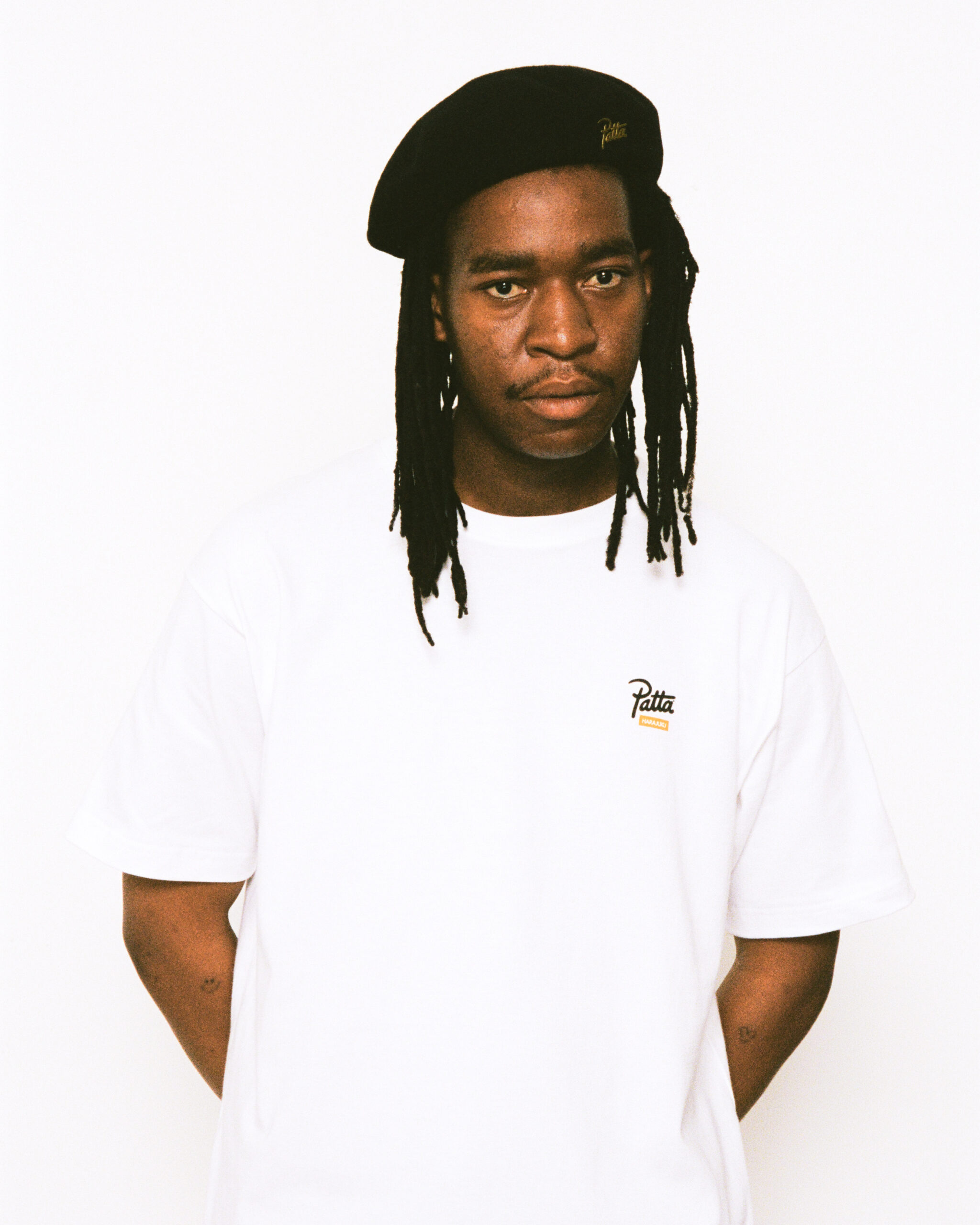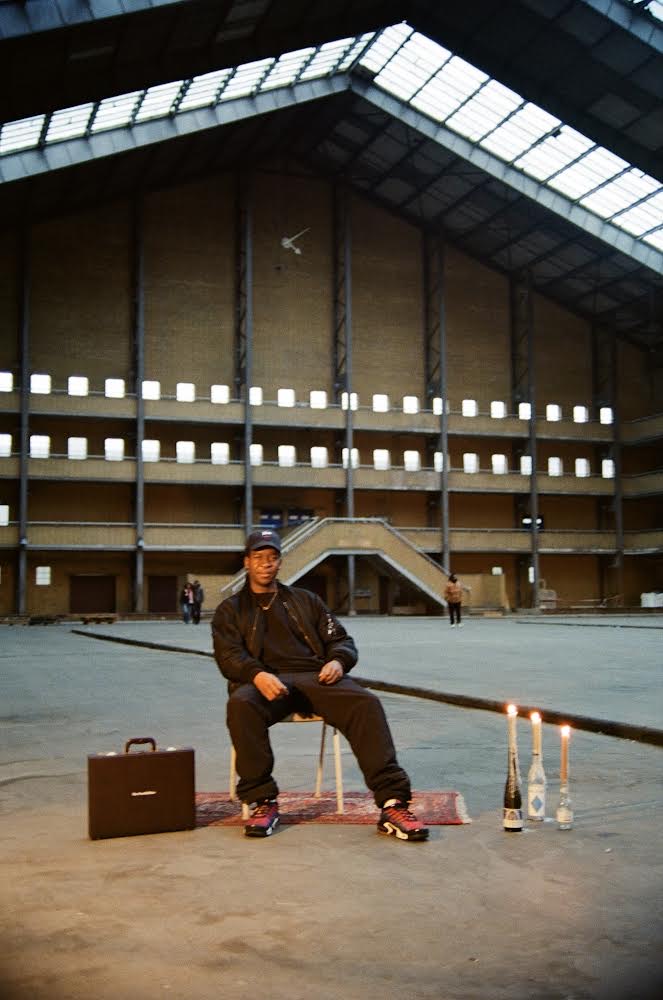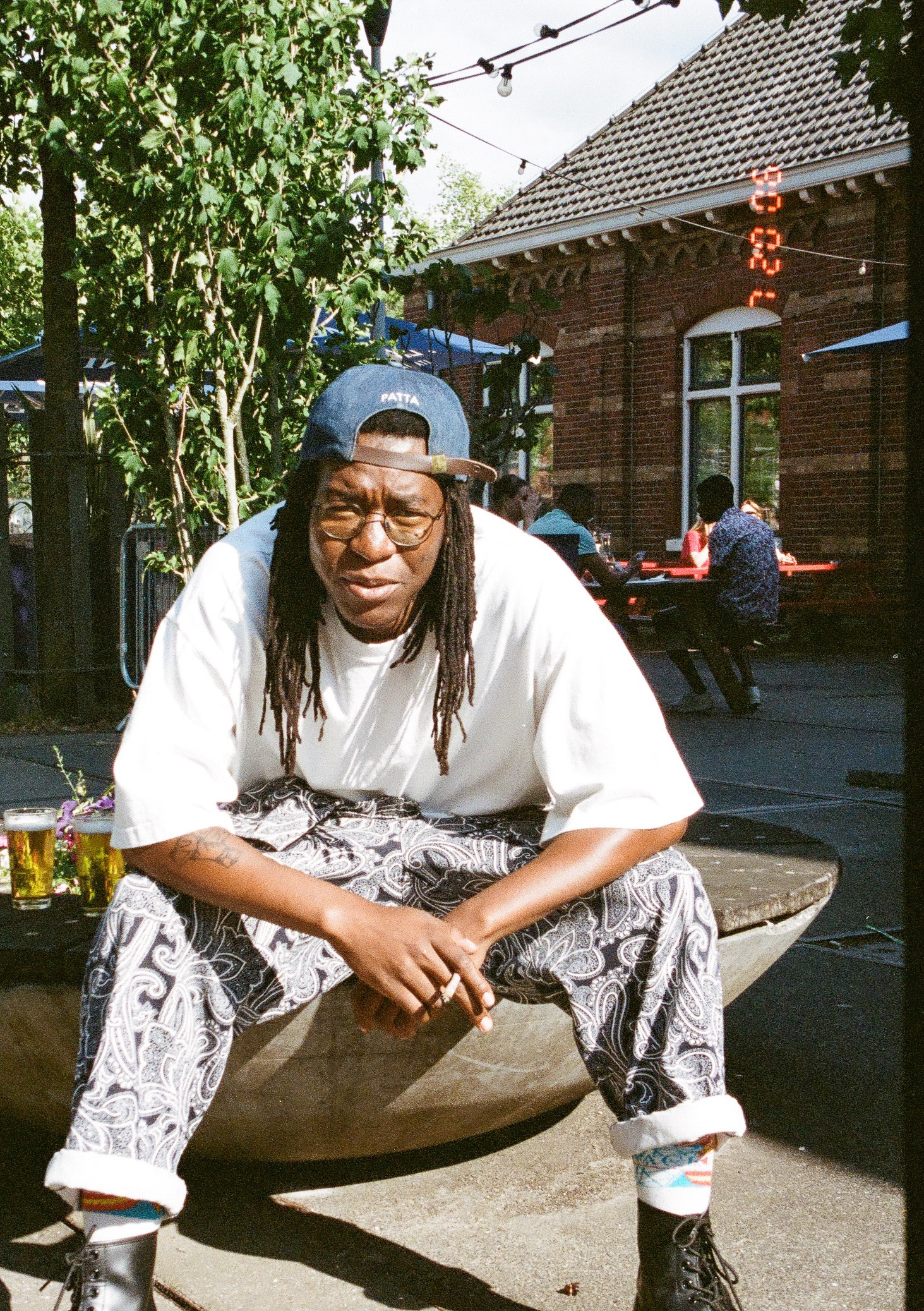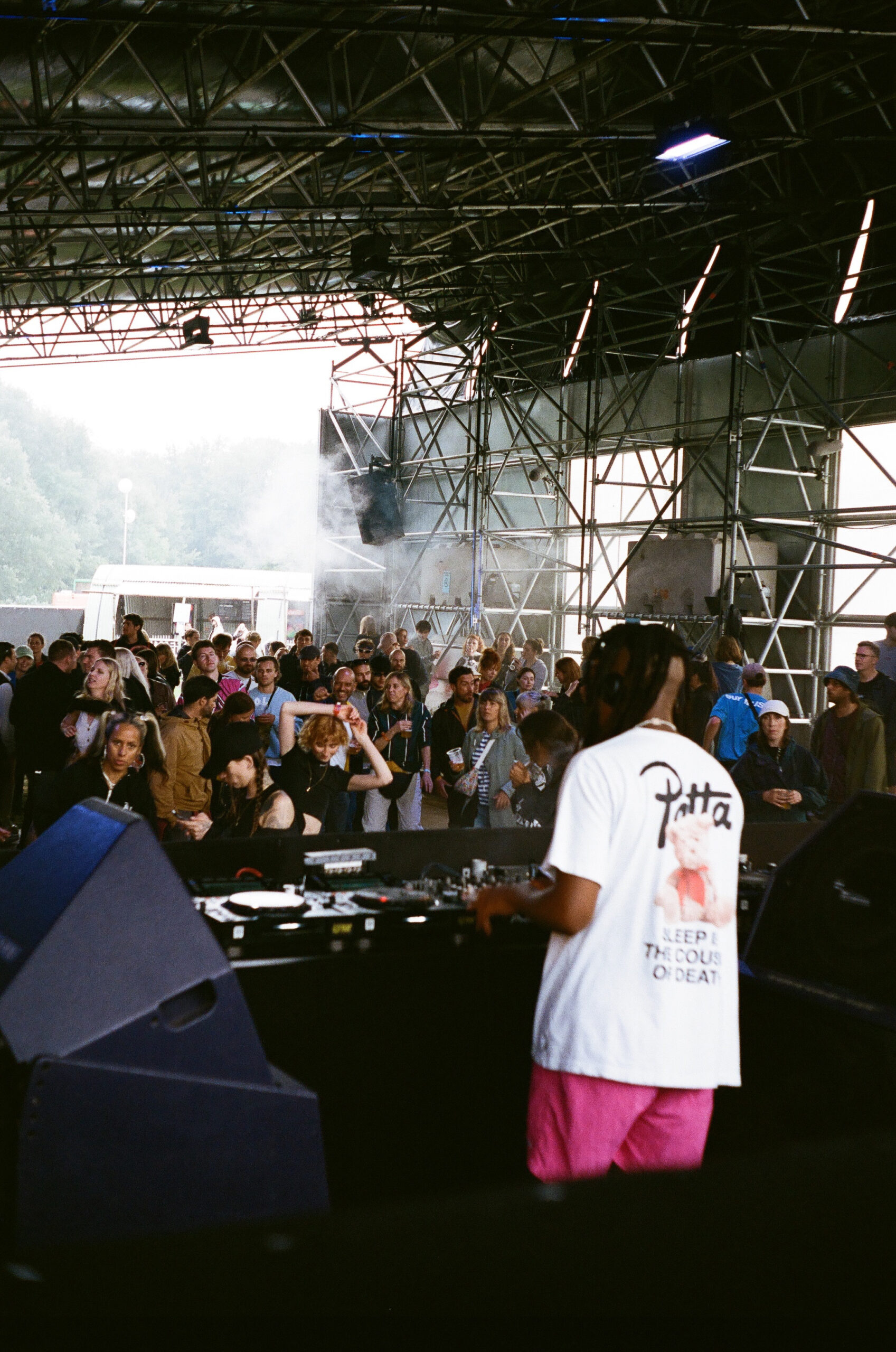“Radio is the most important thing you can ever do”

As I get on a Zoom call with Passion DEEZ, the Glamcult office floods with UK grime blasting from DEEZ’s speakers. He promptly pauses the music, but it’s evident that his mind is still in the sound – DEEZ exists in a constant state of sonic absorption and education. Leading with bass-heavy international sounds, DEEZ’s mission is to unite diverse spaces and uplift migrant voices through his sets and event curation. A name that’s hard to miss in Amsterdam’s scene, DEEZ seems to be everywhere all at once, having played practically everywhere from De School to Dekmantel. What truly shaped his artistic ear and intentional storytelling behind his practice, though, has been his long-standing involvement in pirate and community radios. Now, with a mindset of a true selector, DEEZ is merciless in his mixing, setting the dance floor ablaze every set without fail. Full of excitement for this Friday’s Glamcult Selects x NO-GA party at Tilla Tec, we caught up with DEEZ for a very ‘nerdy’ chat.
Let’s get right into it! What were your first encounters with music?
I was born in Zimbabwe, I grew up in South London. One of my first toys was a radio, and I was obsessed with it – I knew all the presenters and timetables. I could tell you the entire residence off the back of my hand. I got into great music because of the radio. I liked the idea that you could share art in a curated manner that wasn’t necessarily an album. This was pre-playlist culture. Around age 14, I learned how to DJ, and my friend and I started doing pirate radio shows. We started getting gigs in London, and I guess the rest is history.

Nice! It’s great to see that the love for radio has stayed with you in your work now.
The important thing about radio is that it platforms a community. In commercial radio, you have to play certain songs, and in certain countries where taxpayers pay for the radio, you can’t even play music from outside your country for too long. What I love about pirate radio is that Indian diasporic kids can have their own show. Grime kids can just bring 10 of their friends into the studio, a USB stick, some CDs and just tell their story. It’s a very pure way to tell a narrative, and that’s what I’m obsessed with.
How is this obsession with storytelling reflected in your DJ sets?
If you listen to my radio shows, I tell stories about every show that I do. Clubs and festivals were never an aim of mine. I only wanted to be a radio presenter. On the radio, you have a lot more control over what’s told, whereas with a club or a festival, you’re supposed to read the room. And if you see that people want to go in a certain direction, you have to be able to adapt your story to fit that direction. If I start noticing that old garage is making a comeback, I will lean more into the garage and show people what I know about it. If I play grime and they’re feeling it, I’ll be like, okay, this room really likes grime. It’s a less controlled narrative.
You play so many diverse genres and tap into different subcultures, yet I feel like there is always a certain coherency present in your sets. How have you built up your signature style?
I sat down with myself and made my DJ manifesto. I called it the Brexit Bass, as at that point, I was really trying to push UK bass within the EU. The easiest way to do that was by leaning into garage and drum and bass. I come from grime and dubstep, but I knew if I wanted to create an audience I needed to lead with something a bit closer to house music. Garage is essentially house music, its full name is Garage House. I also knew drum and bass would work, because if you do the maths, house is two-thirds the speed of drum and bass. So, when you listen to house, you can switch to drum and bass and get it instantly. What’s beautiful about drum and bass, is that if you cut the tempo in half, it’s the same speed as R&B. It was super easy for me to contextualise this UK dance music to a European crowd.
Yeah that makes sense – it feels like the UK sound assimilated pretty organically into the European dance culture. Has that changed your approach?
Yeah, the UK scene is fully here. You see people like Interplanetary Criminal and Sherelle selling out shows, so it’s not my narrative to tell anymore. Now, my narrative is more about exploring the diasporic bass culture. It’s about migrant communities from all over the world who come from indigenous roots – whether you’re Native American, or Maori, whether you’re from my tribe, the Shona tribe, I’m trying to express their story at home and beyond. I tap into genres like Baile Funk, the Durban South African house that you’re seeing at the moment, or proto-drum and bass stuff that’s happening over in Oceania. India is also a perfect place for that, as their music is very rhythmic. But I’m also very aware that I’m based in Europe. To contextualise this stuff for Westernised audiences, I have to sequence my tracks very coherently. I’m still not playing house and techno – because all my friends who play house and techno are really good at it, and it’s their story to tell. I’m very grateful that I’m accepted in that scene though. A lot of people who play what I play end up at Bitterzoet, not De School.

There’s definitely a big space for that now. It’s beautiful to see how the European underground is becoming more welcoming and respectful towards international indigenous voices that have been flying under the radar for so long.
Yeah, you’re seeing it with reggaeton, for example. Reggaeton is the biggest genre in the world, but living in English-speaking countries, we think our shit smells the best. When you actually look, you realise that Bad Bunny’s been at the top of the world charts. You can’t ignore the Global South anymore. When I started, it was just cis white dudes. It’s really uplifting to see so many amazing women from Mexico and South America coming here, and having sold-out shows. People like RP Boo from Chicago coming in and having sold-out shows. To me, it’s very important to platform underground minority music. I don’t have to play a white guy from Berlin. He’s already got an audience and all the opportunities to succeed. But a girl from South America who saved up for two years so she could buy a drum machine and make one song, deserves all the space in the world.
I suppose it’s a bit of a ‘duty’ that us immigrant kids feel. To build up those bridges and give whatever platform we have to minority communities, even if it’s not our community directly.
It’s a really beautiful thing to see immigrant kids come to my shows. Thank you so much for coming to my shows. There was a girl from India, and she saw me play a Punjabi track at Dekmantel. For once, she felt like she was on the stage and that she was appreciated. When you go to these super white environments and you’re hearing super European music, as soon as you hear something from your own country, you’re like, wow, I feel seen. When I moved here, I didn’t feel seen in dance music. All the music was played by European guys who called themselves World Music DJs. When these opportunities came up for me to do radio, clubs, festivals, I couldn’t turn them down because I knew there’s a lot of kids like me who came to the city and do not feel seen.
Yeah, you know the feeling. And what attracted you to come to Amsterdam in the first place?
I started DJing 16 years ago, but I paused for a good five years because I wanted to pursue other mediums. I used to be a fine arts documentary photographer, do printmaking and film. I had three group shows, and two solo shows. When I was 23, I got invited to an artist residency out here which sounded like a great opportunity. I was just working at Domino’s and skateboarding, not really doing anything with my life. I’d always wanted to come here – I used to have an Amsterdam flag in my bedroom from 17 years old until I got here. I came here, and everything fell into place within 10 days. I’d made a circle of friends just by going outside on my own and walking the streets. Compared to London, where I’m from, Amsterdam has such an energy for collaboration. In London, people keep their opportunities to themselves, and if you’re multidisciplinary, no one takes you seriously. And I’ve always seen myself as multidisciplinary. I can make visual art, or the music thing, or rap and skateboard. To call yourself one thing is to limit what you are in this one life. And here, I was given the opportunity to live all the lives that I wanted.

Well, now your home is here! You play so often in Amsterdam – there is always a way to see you practically every weekend. How do you maintain this energy and find the inspiration to still make every set so unique?
It really feels like it’s my mission to push diasporic sounds in club spaces, which gives me the energy. My booker and I are actually quite selective, we turn away a lot of work. But one rule I’ve set is that I want to be accessible. Ever since my Boiler Room went viral, I had commercial success and played at big festivals, I’ve noticed that my audience has become more homogenous. It’s become very affluent white people with mommy and daddy money and a cocaine bank account. And I still want to be accessible to kids like me. If I look back five years ago, I had like 2k to my name. Do you think I’m buying Dekmantel or Lowlands tickets? Absolutely no.
Haha, not forgetting the actual ‘underground’ you come from.
It’s super important that I still exist within my community. I have really good relationships with a lot of producers, and I get 30 to 40 new songs every week. I have so much music that I have to play outside. I want to be accessible, if it’s your birthday, your mom’s in town, your friends from college are in town – I’m there. Some weeks though, I choose to rest. I have a lot of projects that I work on, also in the fashion industry. I have these bigger ideas that are outside of clubs.
That was actually the second part of my question. How do you recharge, and take care of yourself and your body in such a hectic rhythm?
16 years ago, I started making money from DJing but not enough to do anything with it. I used to be a chef. I like going out and eating good food or cooking at home. I love steaks and I love octopus. I love going to the sauna. That’s one of my favourite activities. Everytime I leave the sauna, I feel 16 again. Yeah, seafood and sauna is my secret.
Saunas are so underappreciated, it’s literally where I’m planning to be the whole winter.
It’s one of the few places where I’m truly alone. Nobody talks to you. You can’t take your phone with you. In most of the things that I do, people talk to me all the fucking time. I love the amount of respect that people give this ritual of sauna. I’ve always been appreciative of places where adults are silent. I think it has a lot to do with being raised in the church. I used to love church even when I wasn’t feeling too faithful, just because I like being in a room with silent adults. The only other places I’ve seen adults just shut up and be normal have been in the sauna and the nightclub.
Sauna is diametrically opposite to a club, but is also similar in a way – because you’re allowed to be in your zone in both spaces. And then there is also the sweat, of course, haha.
Yeah, exactly. I’m really appreciative of those third spaces.
Do you have any advice for upcoming DJs, musicians, or tastemakers?
Radio is the most important thing you can ever do. At the studio, there’s an intern or employee who’s also a music nerd obsessed with telling stories. You can make any kind of radio show. You play in front of these nerds, and after the show, you get to talk to these nerds, and then the next nerd will come and DJ. When you’re around these motherfuckers who are also clearly obsessed with something, you get to hone your craft a lot better than doing it in isolation. It’s cool to DJ at your house or with your uni friends or to do it at clubs because you’re the one who gets the party started. But no one will ever critique you or give you meaningful suggestions. Those nerds at the radio station are not there for clout. They’re not there for the guestlist. They’re not dancing behind the booth to be seen. So, if I were to start again, I would do radios and not step into a club for at least a year. If you can pull off 10 radio shows, then you’re ready.
You also get to understand the intention of why you’re doing it in the first place.
And it’s what we see now post-BLM, post-Covid, with the world opening up – we lost the quality control. I think it’s super important that we get it back, and most of it comes from going through radio stations. You can go viral on TikTok and go play, but the room will be empty because you’ve never had anybody challenge you and you don’t have anything to say. Not saying you have to take everyone’s advice, but it’s nice to have critical thinkers around you.
On that note, any last words?
Come to Passion Deez and Friends. If you want to talk to people who can help you, that is the environment. We have all walks of life, and the thing that connects us is that we all just want to connect. If you’re obsessed with anime music, come to the party. There’s a kid who likes anime. If you’re obsessed with metal, come to the party. There’s a kid obsessed with metal. I’m very grateful for what I’ve been able to build, because I feel like all the outsiders feel welcome wherever I am. There’s actually more outsiders than insiders at our events. The outsiders and the nerds and the losers stick together.
Love that. Thanks for speaking with me and can’t wait to see your set on Friday!
I like what you guys do and it’s been a very long time coming. See you then!
Notifications